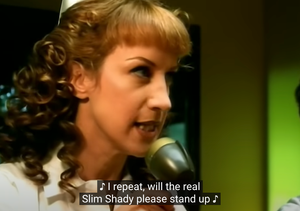Copyright law is fast becoming irrelevant, thanks to the Internet. It's time to start figuring out how to replace it with something that works.
I swore I'd never write another column about the over-exposed, morally underdeveloped, and technologically substandard phenomenon that is Napster. Rest assured, this is not a Napster story.
The fact is, Napster's just a symptom of a larger issue: online copying. Whether it's Napster, Gnutella, or what have you, there will always be some technology giving copyright lawyers fits, because like it or not, the Internet is all about copying stuff [1]. The problem just isn't going away, even if Napster comes up with a workable plan to prevent copyrighted music from being traded on its network. (The company said Friday that it will begin blocking some copyrighted files this weekend [2]. I wish them luck.)
The furor over digital music has been compounded by the fact that in the music industry, the copyright owners are record labels -- and the labels, by and large, have tended to be opportunistic, nasty, exploitative, greedy bastards [3]. It makes people happy to rip off an industry that has thrived for so long on ripping off the artists who create its products and the consumers who buy them. But guess what: Napster may be a big poke in the eye of the recording industry, but it's no Robin Hood. It takes from the rich, but it doesn't give anything to anyone. All that consumers get, really, are crappy MP3 copies of songs and the dubious pleasure of waiting for those songs to download; they still have to buy the CDs if they want good sound quality, liner notes, or anything approaching convenience. The artists, well, they get nothing.
The recording industry hasn't made any friends through it's heavy-handed and self-defeating efforts to stem the onrushing tide of technology. By shutting down Napster, the industry is losing its best shot at co-opting a popular file-trading service and turning it towards profitable ends, as I've written before [4]. And when the industry starts sending robotic thugs after copyright infringers, it's not helping its public image, either [5].
Similar crises over copyright are boiling up in every industry that's built on intellectual property. Writers and magazines are duking it out over electronic republication rights. The software industry is going ape over international piracy. Book publishers are wrestling with the possibility of e-books. Moviemakers have started to agonize about digital video. The list goes on.
In the old days, copyright was a simple matter. Before the Information Age, there was no real distinction between information and its physical form -- a copy, say, of a book. Copyright is a relatively enforceable proposition when you're talking about physical stuff. It's difficult to make good, physical duplicates, so copyright owners have a chance of detecting counterfeits, tracking down the copiers, proving that their rights were infringed, and stopping the copying. By the same token, physical copies have actual value, in proportion to their scarcity.
But here's the Internet, which at a very fundamental level is all about copying. Consider email, the single most-used application on the Net. You don't ever really "send" a message when you use email. Instead, you make a chain of copies. When you hit the Send button, your ISP's or company's mail server makes a copy of the message. Another mail server, somewhat closer to your message's destination, gets yet another copy, and then another server, then another, and so on until a copy arrives at the recipient's mail server. When that person downloads their message, they make one final copy on their own hard drive, and there it is -- the message has "arrived." Except, unlike a letter, the email message hasn't really traveled, it's merely spawned a handful of copies.
A similar principle holds for much of the Internet's underlying infrastructure. It's copies all the way down.
Because of that, there's probably no way to enforce digital copyright. If you forward this issue of the Tweney Report to someone else, you're making more copies, and there's not much I can do about it. Of course, this newsletter is copyrighted by me (please note), but as for serious enforcement of that copyright? Forget it. Unless I find you've posted this column on your own site, or that you're selling copies of it for your own profit, there's basically no way for me to prevent the distribution of this particular collection of bits.
By the same token, if I'm really determined to share my favorite MP3 track with the world, there's no effective way to stop me from doing it. Shut down Napster? I'll use OpenNap. Block ISPs who are hosting OpenNap servers? [6] I'll go over to FreeNet, a decentralized, peer-to-peer network that is designed so that posted files automatically spawn multiple copies. Once a file has been published on FreeNet, it's impossible to completely eradicate all copies of it.
Forget copy protection, since hackers consider it a challenge to break in to anything forbidden, and will quickly crack any copy protection scheme, then post the protected content to the Net for all to see. Besides, copy protection is almost always annoying to customers, even the honest ones, and often gets in the way of legitimate and fair-use copying.
Ultimately, if content can be copied immediately, perfectly, and distributed globally at essentially zero cost, then the economic value of a copy drops to zero, and copyrights become worthless. That means content producers and publishers need to find another way of making money from their creative efforts. Fortunately for content people, the problem may contain the seeds of its own solution.
The ready availability of free copies gives rise to what I'll call the infinite monkeys problem. You know the thought experiment: If you set an infinite number of monkeys down in front of an infinite number of keyboards and let them bang away at the keys randomly, eventually one of them will produce the complete works of Shakespeare. But to get that perfect copy, you'd have to wade through an infinite number of almost-perfect copies: editions of Hamlet where one word is misspelled, copies of A Midsumm'r Night's Dram in which the letter "e" never appears, sonnets that are interrupted with quotations from Dan Rather's folksy election commentary, and so forth.
The same problem appears on the Internet. If an infinite number of copies are available, it's certain that some of those copies will be flawed. In fact, you have no way of knowing whether you're getting a good copy or not. Even when the technology exists to make perfect copies, some people will intentionally post bogus copies, just to mess with you. This is already happening on Napster. Just because a file is called "Real_Slim_Shady.mp3" doesn't mean it's the real thing at all; instead of Eminem's hit song, it might be a parody, a recording of somebody reciting passages from the Bible, or a track from Yanni's last album.
In fact, content producers who want to protect themselves might intentionally post altered copies of their content, in order to jam the free channels. For instance, if I found that illicit copies of the Tweney Report were circulating on FreeNet, I could retaliate by posting a bunch of files to FreeNet that bore filenames suggesting they were my newsletter, but which actually contained recipes for chocolate ganache cake, or excerpts from the Communist Manifesto. Or, more deviously, I could post versions that read much like the real newsletter, except they contained a few hidden errors, or stated the exact opposite of my real opinion. In short order, FreeNet would become a totally unreliable source for copies of the Tweney Report, because you'd never know whether you were getting the real thing.
The infinite monkeys problem points to a possible solution for content producers and publishers. When freely-available copies are unreliable, there is value in a certified copy that comes directly from the source, or from an authorized broker. In other words, although there's no longer any economic value in controlling the making and distributing of copies, there is still economic value in the identity of the musician, writer, artist, or programmer.
Imagine the above scenario, except instead of Tweney Media, I'm a pharmaceutical company, and instead of issues of my newsletter, it's a trademarked and patented formula for a cancer cure that's getting posted to FreeNet. Imagine the havoc the pharmaceutical company could cause by jamming FreeNet with spurious formulas. The upshot: If anyone wants the real formula (and not, say, a formula for a fast-acting central nervous system toxin) they'll have to come to the pharmaceutical company and pay the licensing fees.
The technology to authenticate the identity of people and companies already exists, but it's not yet standardized, widespread, or understandable enough to be a practical underpinning for significant business activity. I'm certain, however, that this will change, especially once there's a strong economic incentive for a simple, easy, reliable authentication system.
And as authentication grows in importance, we may need to replace copyright laws with laws governing the use and authentication of identities. As the W.E.L.L.'s old motto goes, "You own your own words." Maybe it's time to formalize that statement legally. Perhaps something akin to "identity right" or "author right" will come to replace copyright.
When it does, by the way, there's no guarantee that today's middlemen will still be in the middle. Publishers, record labels, and movie studios currently make money by controlling reproduction and distribution. In the future, content middlemen will be able to make money by authenticating the identities of content creators, collecting payments, and policing identity infractions. Middlemen will also be able to add value (and hence make money) by selecting quality content and by helping to produce it -- the role that editors and recording studios play today. And there will be middlemen acting as gatekeepers to markets and communities of interest. But whether all of these roles will continue to reside in one place is an open question.
Postscript: A new book examining digital copyright has just come out [7]. I haven't got a copy of this book yet, but it looks like a serious attempt to examine the copyright crisis and potential solutions. I'm looking forward reading it.
[1] Copyright laws at stake in Napster case
[2] Napster Tells Judge It Will Block Copyrighted Music from Its Site
(subscription required)
[3] Courtney Love does the math
[5] Software hunts for bootleg tunes on users' drives


